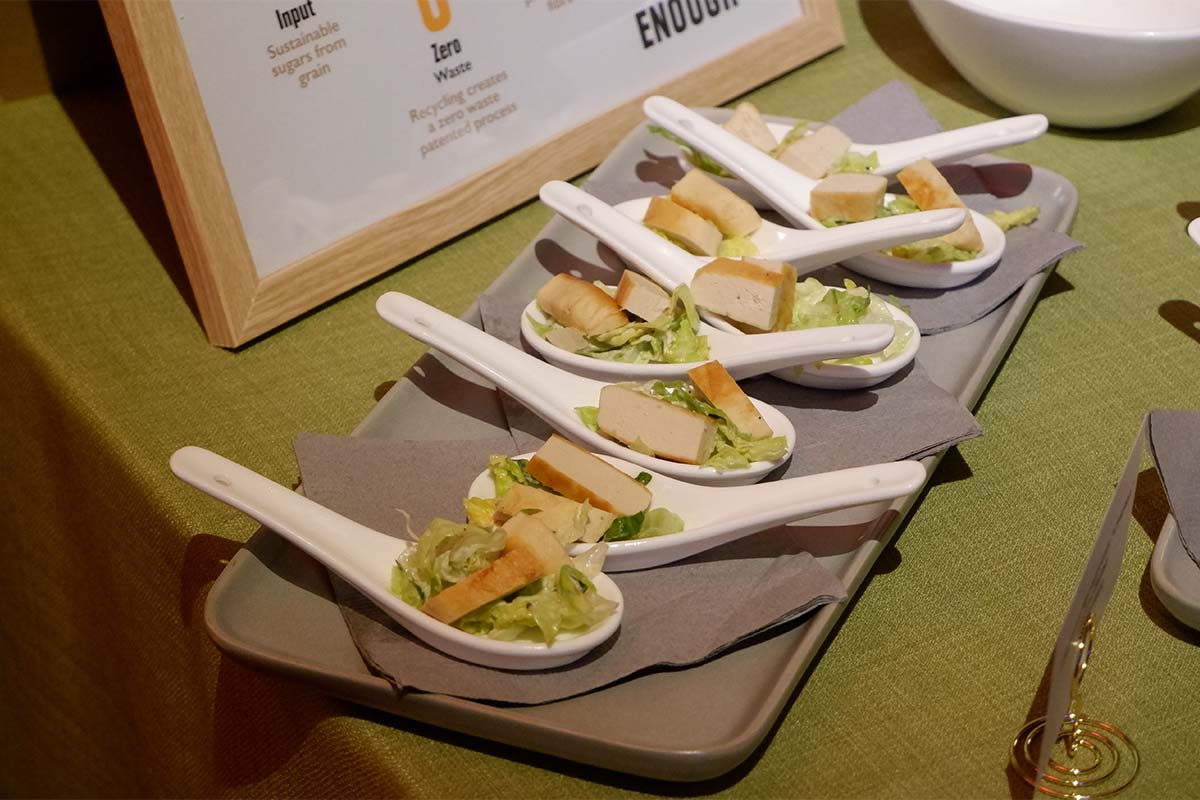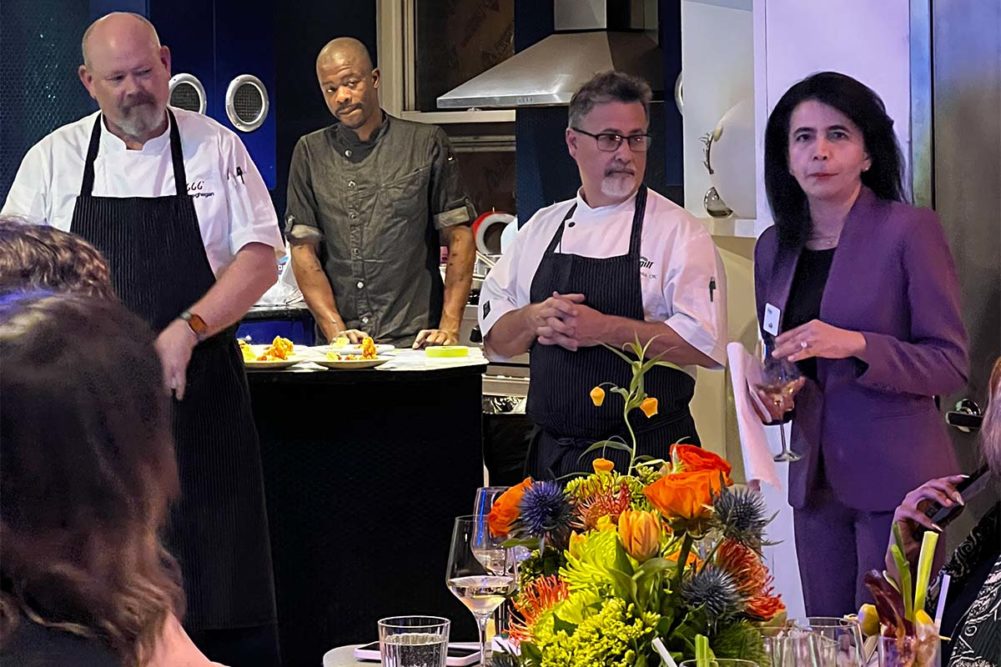On an unseasonably warm February evening in New York City, Cargill threw a dinner party with a purpose. More than two dozen individuals — journalists, influencers and Cargill team members — converged on an event space in Manhattan’s Chelsea neighborhood to learn and sample the fruits of the company’s commitment to nourish the world in a safe, responsible, traceable and sustainable way.
Taste of the Future was designed as an “interactive culinary and sensory dining experience,” where attendees explored and experienced global food trends. The company also unveiled new culinary innovations from Cargill partners including McDonald’s, PepsiCo and Enough mycoprotein. Cargill chief technology officer, Florian Schattenmann and chief sustainability officer, Pilar Cruz hosted the event, which featured individual booths staffed by team members who explained the process behind creating the product.
“Our hope and intent is to give you an experience of what sustainable food or sustainable production of food is possible around the world, thanks to companies like Cargill,” Cruz said. “So, we’ll give you a flavor of sustainable production in salmon, as an example, in Norway. It’s truly an experience from farm to fork, and we are going be telling you the story of where the ingredients are coming from.”
Innovation on the menu
The event showcased just how far one company can go to connect the steps from sustainable production practices to the finished products. Stepping into the event space from an elevator, and upon leaving a narrow vestibule for coat checking, attendees were presented with a series of table-top exhibits highlighting a few of Cargill’s success stories in sustainability.
The first success was Cargill’s role in helping McDonald’s Corp. reach its goal of using 100% cage-free eggs in all of the company’s US restaurants — two years ahead of schedule. McDonald’s announced its commitment to sourcing cage-free eggs in 2015 — a significant shift for a franchise that purchased roughly 2 billion eggs in 2023.
“Our journey to move to sourcing 100% cage-free eggs in the US was a huge undertaking — made uniquely possible by our owner/operators, Cargill and their egg producers, and our supply chain working together as one team,” said Bob Stewart, senior vice president, North America chief supply chain officer for McDonald’s. “I am incredibly proud of what we achieved together and the positive impact we will continue to make on the path toward a more sustainable future.”
Egg producers for Cargill raise hens in open spaces allowing them to express natural behaviors. Housing for the birds consists of nesting boxes and enrichments such as perches and scratch areas. Cargill has invested nearly $850 million since 2019 to help egg producers convert to cage-free while offering long-term contracts for their eggs to help them obtain financing from lenders.
“Creating a supply of cage-free eggs at McDonald’s US scale wouldn’t have been possible without the support of Cargill and their egg producers, including Minnesota-based, fourth-generation family business Forsman Farms,” McDonald’s said in its announcement. “We engaged animal welfare experts and academics to help egg producers build and renovate their farms and implement new technology. This included Herbruck’s Poultry Ranch, a fourth-generation family business in Michigan, operating since 1958 and supplying Cargill for the McDonald’s system for decades.”
Cruz said the commitment and partnership that Cargill has with McDonald’s is part of a broader initiative to drive the adoption of regenerative agricultural practices in the United States.
“It makes me very proud because then you can see that it’s not just having a strategy,” she said, “it’s having clear goals that we have communicated externally, but it’s driving through the execution of our business plans, making investments, partnering with customers, and driving solutions that are more sustainable.”
 "Chicken" nuggets made with mycoprotein demonstrated the versatility of an alternative protein that Cargill has invested in through its partnership with Enough, a company that specializes in fermented protein. (Source: Erica Shaffer/Sosland Publishing Co.)
"Chicken" nuggets made with mycoprotein demonstrated the versatility of an alternative protein that Cargill has invested in through its partnership with Enough, a company that specializes in fermented protein. (Source: Erica Shaffer/Sosland Publishing Co.)Sustainable partnerships
A report released in August 2023 by financial services company, CoBank, pointed to lingering negative consumer perceptions of plant-based proteins as a headwind to the industry broadening appeal of plant-based options.
“According to SPINS data, the peak in plant-based meat sales in 2020 stemmed from a combination of factors: consumer interest in trying the products coupled with greater discretionary income, as well as curiosity about broadening their food spend in the wake of food product shortages. Yet, fewer than half of Americans who tried the products at the time repeated their purchase, according to global market and research agency Mintel. Whatever the reason for purchase, plant-based offerings appear to have fallen short in terms of either cost or performance.”
However, Cargill continues to make headway in the plant-based protein space, undeterred by the changing fortunes of the category. Schattenmann explained the importance of developing options for a growing global population that will require 70% more protein over the next 25 years.
“You cannot service this with one form of protein only,” he said. “You have to provide more options, and you also have to align where the consumer actually wants to go. At the end of the day, we are doing this for more diversifying groups of consumers. So, I think we have to create those options.”
At the Taste of the Future Event, plant-based proteins shared the platform with chicken, beef and seafood. The menu featured plant-based chorizo-style protein lettuce cups and plant-based meatballs with Cargill’s Elefante tomato sauce and oils.
And at the protein booth, for example, “chicken” nuggets made with mycoprotein topped Caesar salad served in Asian-style soup spoons demonstrated the versatility of an alternative protein that Cargill has invested in through its partnership with Enough, formerly 3F Bio, a food company that specializes in fermented protein.
In February, Cargill and Enough expanded their partnership. Cargill was an investor in Enough’s Series C funding round and entered a commercial agreement to use and market Enough’s mycoprotein product called Abunda. Enough’s 5,000 square meter production facility is co-located alongside a Cargill facility in Sas van Gent, The Netherlands, where Cargill provides the mycoprotein producer with glucose syrup and utilities.
Abunda is made by feeding fungi with sugars from sustainably sourced grain that is grown in a natural fermentation process, according to Enough. Abunda mycoprotein is a complete food ingredient containing nine essential amino acids and is high in dietary fiber with a neutral taste making it highly versatile in a range of product applications.
“I think plant-based has done a pretty good job of creating products,” Schattenmann said. “But how do we keep consumers coming back to them? That’s been a challenge,” along with accommodating regional differences in tastes.
Additionally, the excitement surrounding plant-based proteins was driven by a hype curve that happened to fall on top of Covid, when consumers were willing to experiment due to shortages of animal proteins, Schattenmann said.
“So, there was a lot of excitement going on and, and that’s part of the venture capital world that drives on creating hype to get the funding — and then it’s hard to live up to it. But as a conscious player in a supply chain that plays across all forms of protein, we’re going to go more methodical around this. For us it’s about the trifecta. So, taste and texture are absolutely number one because people will try it and if they don’t like it, they’ll never come back.”
Number two in the trifecta is an integrated supply chain that can effectively deliver the ingredients necessary for an acceptable nutritional profile. Schattenmann explained that the “pure players” that came up in the plant-based segment over the last 10 years have focused on ingredients by using a material science approach.
“Basically, here’s the taste and texture we try to match, and in order to do that, I’ll take any ingredient I can find. I have to ship that there and have to buy it — if it takes 25 or 30 ingredients, that’s what it is, right? We have to see something like that’s six, eight, 10 ingredients max.
“We feel as a fully integrated player from the crop to the final meat products we can integrate that supply chain. I think that this is going to help with costs; it’s going to help with the overall effectiveness.”
The final part of the puzzle centers on simplifying the processing. This can be achieved by using natural ingredients like mycelium.
“And so, we have seen some examples in the lab so far, but where with much less ingredients, you can come much closer. So that will help with nutrition profile; it will help with cost and, hopefully over time, also with taste and texture. That’s where a player like Cargill, that is really dedicated to the animal protein space too and understands that really well — I think we can learn and share across” plant-based and animal-based proteins.
 The Taste of the Future menu featured a variety of dishes, but all the ingredients are traceable end-to-end through Cargill's supply chain. (Source: Erica Shaffer/Sosland Publishing Co.)
The Taste of the Future menu featured a variety of dishes, but all the ingredients are traceable end-to-end through Cargill's supply chain. (Source: Erica Shaffer/Sosland Publishing Co.)Making introductions
Taste of the Future treated a small group of people to an experience of what sustainable production of food is possible around the world because of companies like Cargill.
“So, it’s truly an experience from farm to fork, and we are telling you the story of where the ingredients are coming from,” Cruz said.
The sake-marinated salmon served that evening came from Norway; and Cargill is a leading supplier of fish feed made from sustainably sourced ingredients that are traced end-to-end in the company’s supply chain.
The seared USDA Prime beef tenderloin topped with ancho chili tequila butter was produced by Four Sixes Ranch (6666 Ranch), Guthrie, Texas, which uses regenerative agriculture practices to promote healthy soil, preserving habitats for co-existing wildlife and maximizing cattle genetics.
Cargill’s chocolate, Diamond Crystal Salt Co. baking salt, beauty care and stevia-derived sweeteners and many other products — all have a basic sustainability story that the company is excited to tell. Future iterations of Taste of the Future could include different US cities, or events in Europe and Asia.
“We are in the brainstorming stages,” Schattenmann said following the event.
“This is a first for us. It was sort of an idea how to engage and how to tell a story. So, the feedback has been tremendous. I think there’s a lot of interest,” she said. “A fair amount of people really didn’t know Cargill, so what a way to introduce yourself.”



